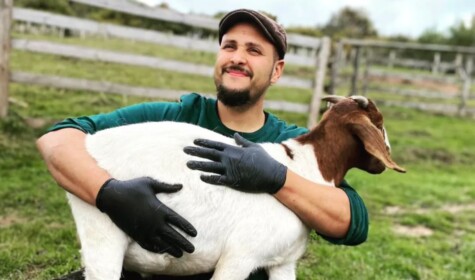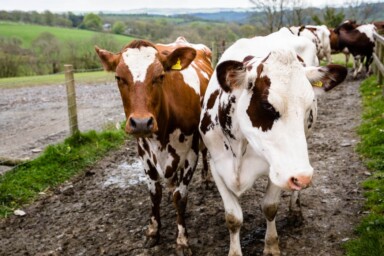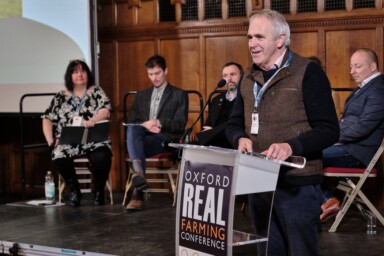Muhsen with one of the Harmony Farm chickens
The chickens come through one by one after being dipped through a water bath stunner in which an electric current is passed through the water. This renders the birds unconscious and insensible to pain, immobile but most importantly still alive. If they were to die from the stun, it would not be halal. I then pull the throat taught and make quick incision cutting the throat whilst saying thank you to each chicken for giving their lives for us to eat. Oh and before I forget, whilst in full flow, I also consciously focus on glorifying and praising the lord in my thoughts and saying quietly “In the name of god, the most high.” (That’s the halal bit).
So why all the detail? It’s important to understand what practising ‘halal’ means and what happens during a halal slaughter. I became a Licensed slaughterman because I felt that I should be able to kill what I eat, but also because it’s an important skill to have when living on a smallholding. It has deepened my respect for farming and food production and increased my zeal to open up a conversation about halal slaughter. So many people I speak to think that halal slaughter is a barbaric way to kill animals; the practice is completely alien to them. I empathise totally, so much distorted and biased information is out there about halal meat, that it is generally totally misunderstood.
As a practicing Muslim and as a slaughterman, even I find it difficult to understand all of the ins and outs of halal slaughter. It entails an overwhelming amount of information, and very detailed scholarship on it exists in the classical Islamic tradition. I am not a scholar, but as I understand it, for ‘halal’ slaughter to be carried out, animals should be alive when slaughtered, so they can be classified as slaughtered meat and not carrion (dead meat). This can become very technical as some interpretations of the Islamic Law conclude that the animal must be fully conscious when killed and while others say that they can be unconscious and then killed. This must be done in the most humane way possible, while declaring that the animal’s life is sacrificed to God.
Stunning is widely accepted as a new innovation that reduces the stress of the animal during slaughter, and is consequently more humane. This is why many Islamic scholars have condoned stunning, and the majority of halal meat is stunned before slaughter. However, some Islamic scholars align themselves with Traditional Judaic Kosher law and disagree that stunning is acceptable in halal practice.
Once, while slaughtering turkeys when I was being assessed on a slaughter course, one of the other participants said he disagreed with halal slaughter. Always ready to have a good banter, I responded that what we just did was halal! With wide eyes, he realised that he had misunderstood the idea of what halal slaughter was and admitted that his opinion was formed by the media and social media platforms, and he had never before spoken to a Muslim slaughterman! Noticing a crucifix on his chain, I asked if he was a Christian, and he said he was. I told him that in Islamic law, there is a clear and strong opinion based on the quranic injunction, “The food of the people of the Book is lawful for you, and your food is lawful to them” (Quran 5:5), that says it is permissible for Muslims to eat meat slaughtered by people of the book, meaning Christians and Jews. He was genuinely surprised to hear that, as are many people.
I spend a lot of my time talking to small holders and organic farmers about this, all to try and win them over and dispel the myths around halal, so that they feel confident to sell us high quality pasture-raised and organic meat so we at Abraham Organics, can supply our customers with the best. We have made some great connections with farmers and small holders through the years, and I hope that as the demand grows we will be able to encourage more halal customers to purchase high quality meat. Unfortunately, just like the rest of the population, Muslims often see the higher price as a big barrier; further access to high welfare meat is harder for Muslims – organic or pasture-fed meat that might be available direct at a farmers’ market is unlikely to have been slaughtered in accordance with their faith.









